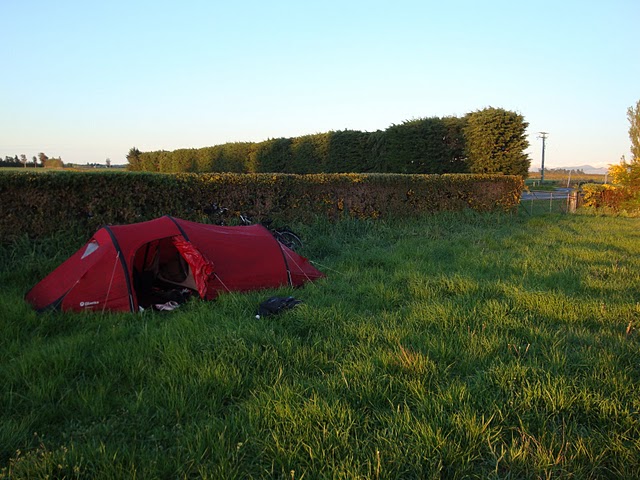We ‘camped wild’ when we’ve failed to find a campsite for the night, to save money and when we have found a lovely spot to just relax for the night.
We haven’t wild camped much yet and are naturally still a bit nervous when we pitch up, Peli more than me. Of course, we do not want to tread on someone’s toes, get into an argument or be asked to leave in the dead of night. But, after a few nights’ camping you relax more, get the feel of a potential camping spot more quickly, get into the habit of setting up camp for the night and don’t jump every time you hear the slightest sound.
The best thing with wild camping is that you get an area for yourself, by a river, in a forest or by the side of a quiet road. Because of that you can enjoy the sun rise or set just for you, experience wildlife close at hand, and avoid having people talking loudly late into the night in the next-door tent.

Generally, wild camping boils down to camping somewhere where people don’t see you and where you don’t disturb others. By all means ask if it’s OK to use someone’s back garden, field or the back of a country pub. Most time you will find that they are fine for you to do that. The pub might just ask you to have a few pints there first. And you might even get asked in for a family meal. Which then means you are not really wild camping any more. 🙂
We have wild camped at 2400 metres in the Pyrenees, behind the hedge next to a B Road and behind a church which had a brand new public toilet. When we asked for a place to camp in one pub in New Zealand we were told that we could use their playground.
There is also ‘stealth camping’ totally hidden away, when only you know where you are, gypsy camping where pitch your tent in a public park or a forest and hope that you don’t get asked to leave. And then the most secret one Ninja Camping … even I can’t tell you about this one, shhhhh. 🙂
Just remember the main rule – leave it as you find it. Take your rubbish with you when you leave.
 – Find a potential place to camp, stalk it for a while first to see if there are any others using the area like dog walkers or other cyclists.
– Find a potential place to camp, stalk it for a while first to see if there are any others using the area like dog walkers or other cyclists.
– Do your cooking before you pitch the tent some a little way away from “camp site” as you can keep an eye on your potential spot for the night. It will help you to pack up and leave fast too if asked to leave.
– Pitch your tent as the last thing you do before you crawl into your sleeping bags.
– When you get up do try to get up with the sun, as dog walkers and horse riders tend to get up bright and early.
– Pack your tent down.
– Cook your breakfast away from your site, it will look less like your have stayed the night. And also easier to pack up and leave if asked to do so.
– Above all do not leave any litter around, take it with you.
– If you need to use the toilet do so away from the site and bury it.
– Open fire, only use it where there is safe to do so or signed that you are allowed to do so. It will attract attention to your site.
– Do your best not to damage anything, try not to destroy the crop in the field you are camping.
Where can you wild camp :
Where you can wild camp depends on the country you are in. Some do have a “freedom to roam” law/rule like Sweden and Scotland and others are against it like Greece.
But then again if you are good at wild camping will they know you are there? If you are near others do ask and from what I read you nearly never get turned away. Just be polite, tell them that you will be up and gone nice and early and will take your litter with you.
Check each country either online or by asking around before you go, just so that you know where you stand when it comes to wild camping.
Finding your site :
The more rural it is the easier it is to find a place, but I have read about people wild camping in bigger cities in parks and behind churches etc. I think the rule that they have in Sweden, where you can wild camp anywhere but at least 500 metre away from where other are living, is a good one. In a field behind hedges are probably the easiest place to find when you are cycling on quiet B roads.
When you have found spot hang around a bit, maybe have a little wander around to see if your spot can be seen from the road or the nearby farm, the road or path that is over looking your wild camp site.
Pitching up :
Try not to “take over” the area and make yourself right at home, make as little imprint as possible. The general idea is to cook, eat get ready for bed (if possible) before you pitch. So you are doing the pitching as it is getting dark.
As you pack up camp the next morning, do so before breakfast. As pitching last thing and packing up first thing will help you to pack up in a hurry if asked to leave. Also make it look like you are not staying for a few days but like you are just having a rest.
What to do if spotted :
I’m sure that at one of the places we wild camped we were spotted. However, that is often either by someone who is passing themselves, so they don’t know who to report it to, or don’t care. Along with the site looking like you are just pitched there for the night and have done no damage to area, I’m sure even the local farmer, hunter or dog walker will let you sleep in and not disturb you. Though if you should be spotted and asked to leave, do so as fast as possible and politely with a smile. They might even tell you where you can camp for the night further up the road.
Here is a few links to other post about Wild Camping, from which I have learned a lot. The main thing is to be polite, take your litter with you and do not do any harm to the environment.
travellingtwo.com – wild camping a few tips good hints to where and how to wild camp.
crazyguyonabike.com : stealth camping by Allan E. Stokell Wealth of information here.
www.mark-ju.net – wildcamp.htm
thebmc.co.uk – a great pdf from the bmc
tom.ride-earth.org.uk – how to camp anywhere and not get busted
guardian.co.uk – holidays wild camping environmental impact

How much effort you put into adequately planning your camping trip will determine how successful and enjoyable your trip will be.